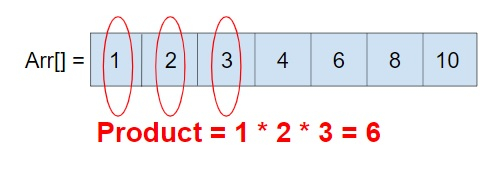
 Data Structure
Data Structure Networking
Networking RDBMS
RDBMS Operating System
Operating System Java
Java MS Excel
MS Excel iOS
iOS HTML
HTML CSS
CSS Android
Android Python
Python C Programming
C Programming C++
C++ C#
C# MongoDB
MongoDB MySQL
MySQL Javascript
Javascript PHP
PHP
- Selected Reading
- UPSC IAS Exams Notes
- Developer's Best Practices
- Questions and Answers
- Effective Resume Writing
- HR Interview Questions
- Computer Glossary
- Who is Who
Product of all prime numbers in an Array in C++
Given an integer array arr[] with some elements, the task is to find the product of all the prime number of that numbers.
Prime number are those number which are either divided by 1 or the number itself, or a prime number is a number which is not divisible by any other number except 1 and the number itself. Like 1, 2, 3, 5, 7, 11, etc.
we have to find the solution for the given array −

Input −arr[] = { 11, 20, 31, 4, 5, 6, 70 }
Output − 1705
Explanation − Prime numbers in array are − 11, 31, 5 their product is 1705
Input − arr[] = { 1, 2, 3, 4, 5, 6, 7 }
Output − 210
Explanation − Prime numbers in array are − 1, 2, 3, 5, 7 their product is 210
Approach used below is as follows to solve the problem
Take input array arr[].
Loop every element and check if it is prime or not.
Product all the present primes in an array.
Return the product.
Algorithm
Start In function int prodprimearr(int arr[], int n) Step 1→ Declare and initialize max_val as max_val *max_element(arr, arr + n) Step 2→ Declare vector<bool> isprime(max_val + 1, true) Step 3→ Set isprime[0] and isprime[1] as false Step 4→ Loop For p = 2 and p * p <= max_val and p++ If isprime[p] == true then, Loop For i = p * 2 and i <= max_val and i += p Set isprime[i] as false Step 5→ Set prod as 1 Step 6→ For i = 0 and i < n and i++ If isprime[arr[i]] Set prod = prod * arr[i] Step 6→ Return prod In function int main(int argc, char const *argv[]) Step 1→ Declare and initilalize arr[] = { 11, 20, 31, 4, 5, 6, 70 } Step 2→ Declare and initialize n = sizeof(arr) / sizeof(arr[0]) Step 3→ Print the results of prodprimearr(arr, n) Stop Example
#include <bits/stdc++.h> using namespace std; int prodprimearr(int arr[], int n){ // To find the maximum value of an array int max_val = *max_element(arr, arr + n); // USE SIEVE TO FIND ALL PRIME NUMBERS LESS // THAN OR EQUAL TO max_val vector<bool> isprime(max_val + 1, true); isprime[0] = false; isprime[1] = false; for (int p = 2; p * p <= max_val; p++) { // If isprime[p] is not changed, then // it is a prime if (isprime[p] == true) { // Update all multiples of p for (int i = p * 2; i <= max_val; i += p) isprime[i] = false; } } // Product all primes in arr[] int prod = 1; for (int i = 0; i < n; i++) if (isprime[arr[i]]) prod *= arr[i]; return prod; } int main(int argc, char const *argv[]){ int arr[] = { 11, 20, 31, 4, 5, 6, 70 }; int n = sizeof(arr) / sizeof(arr[0]); cout << prodprimearr(arr, n); return 0; } Output
If run the above code it will generate the following output −
1705

